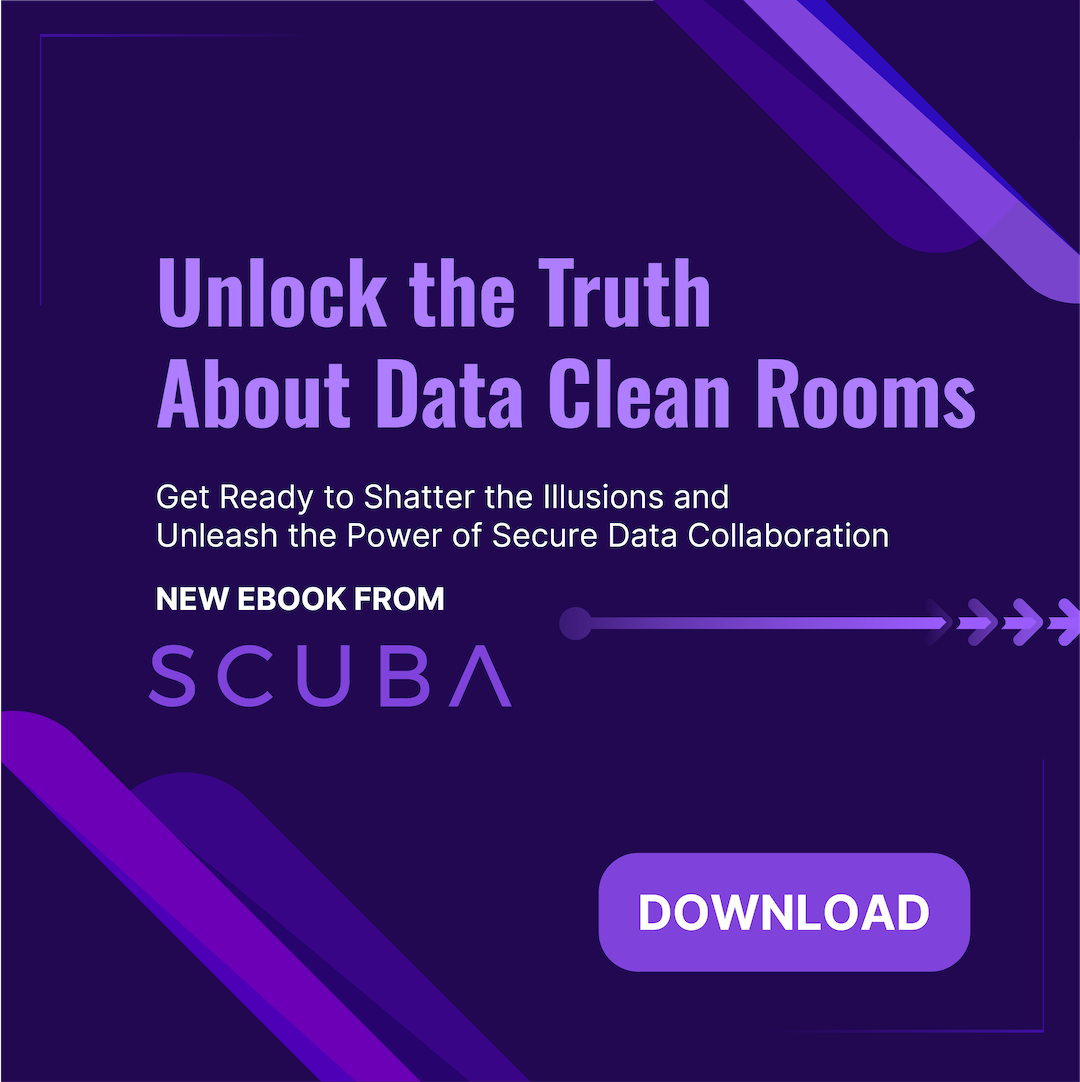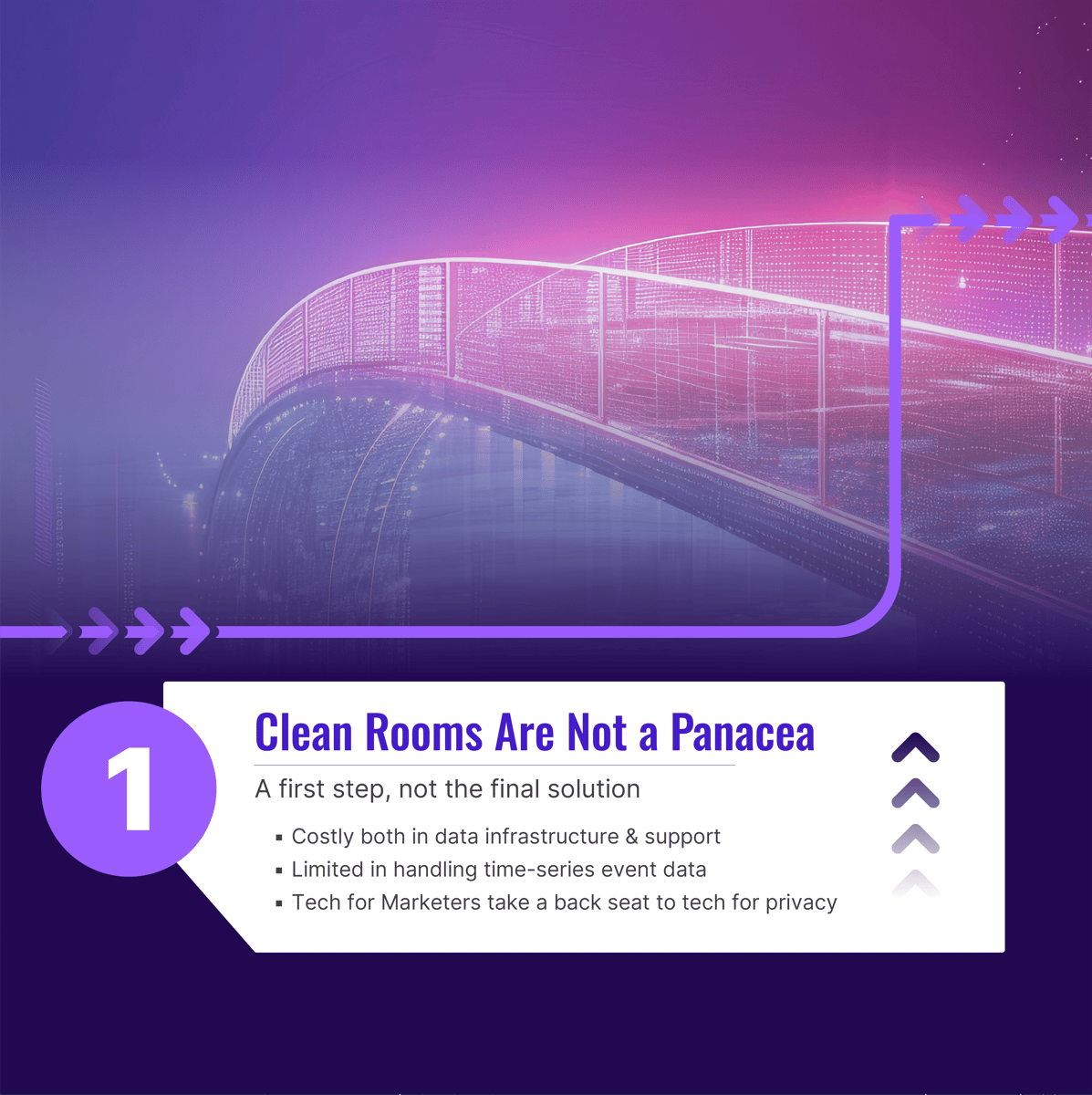Decentralized Data Collaboration: The Future of Privacy-Preserving Data Sharing
By SCUBA Insights
The ability to share and collaborate on data while preserving privacy has become paramount. Traditional clean rooms have long been advertised as a solution for secure data collaboration; however, they come with increased limitations. Enter decentralized data collaboration frameworks, a groundbreaking approach that promises enhanced security, efficiency, and flexibility. Join SCUBA as we explore the benefits of these innovative frameworks and why they are poised to outperform traditional clean rooms.
The Challenges of Clean Rooms
- Centralization: Clean rooms often rely on a central authority to manage and control access to data. This centralization creates a single point of failure, making them vulnerable to attacks.
- Scalability Issues: As data volumes grow, clean rooms struggle to scale efficiently, leading to performance bottlenecks.
- Limited Flexibility: Clean rooms typically enforce rigid data-sharing rules, limiting the ability of parties to customize collaboration based on their specific needs.
- High Costs: The infrastructure and maintenance costs associated with clean rooms are steep for many organizations. This includes implementing and managing the systems, funding for an experienced data science team, and steep upfront costs.
The Snowflake Hack: A Wake-Up Call
On May 30th, Snowflake disclosed that their leading cloud data platform experienced a significant security breach including almost all of AT&T’s wireless customers. Snowflake is investigating a rise in cyber threat activity of identity-based attacks to compromise customer data.
This incident highlights the dire consequences of centralized data platforms falling victim to sophisticated cyber threats. Snowflake's breach serves as a wake-up call for organizations worldwide. As Snowflake intensifies its investigation, the urgency for more secure data collaboration solutions becomes even more apparent. Traditional centralized platforms, such as clean rooms, are increasingly vulnerable to such sophisticated attacks. In contrast, decentralized data collaboration frameworks offer a more robust alternative by eliminating single points of failure and enhancing security through distributed control. Recent cyber threats emphasize why transitioning to decentralized models is essential for protecting sensitive data today.
The Rise of Decentralized Data Collaboration
Decentralized data collaboration frameworks address the limitations of traditional clean rooms by leveraging blockchain technologies. These frameworks offer several key advantages:
- Enhanced Security: Decentralization eliminates the single point of failure, making it significantly harder for attackers to compromise the system. Data is distributed across multiple nodes, each with its own security measures.
- Scalability: Decentralized frameworks can easily scale to accommodate large volumes of data, providing efficient and high-performance collaboration. Organizations can customize their collaboration rules and policies, tailoring the framework to meet their specific requirements.
- Cost Efficiency: By reducing the need for expensive centralized infrastructure, decentralized frameworks offer a more cost-effective solution for data collaboration.
SCUBA: The Solution for Decentralized Data Collaboration & Real-Time Decision Intelligence
Clients can utilize SCUBA's secure collaboration room for in-the-moment decision intelligence, enabling the commingling and anonymization of datasets from multiple data owners in a neutral environment. This setup facilitates insights, measurement, and activation with SCUBA’s industry-leading speed and accessibility. Unlike other solutions requiring multiple clean rooms, SCUBA’s environment supports multiple data sets out of the box.
SCUBA operates as the data controller for secure collaboration rooms, managing data across multiple sources. Our managed service team configures clean rooms and manages access restrictions to prevent access to record-level data or sensitive information (e.g., HIPAA, COPPA).
SCUBA's secure collaboration room environment ensures that your data collaboration needs are met with the highest privacy and security standards, offering a superior alternative to traditional clean rooms. Learn more today.
Download the latest eBook, "Clean Room Disillusion In A Time When Trust Is Paramount: How An Infrastructure-Driven Approach To Data Sharing Is Killing Martech And How To Solve The Problem." 





Blog Categories
Recent Blog Posts
- Crack the Code: How To Maximize Ad Revenue in a Privacy-First World
- MTCDPA: Will Montana’s New Privacy Measure Disrupt the Future of Advertising, and Business?
- Capture Signal Loss with Decision Intelligence
- AWNY24 Session Recap: Privacy Hijacks Signals: Future-Proof 1P Data with Real-Time Data Collaboration
- #PROGIONY: Game-Changers, Fading Fads, and the Future of Advertising
- Publishers’ Responsibilities in the Age of Signal Loss
Popular Blog Posts
- Diving Deeper into Analytics: How SCUBA Fills the Gaps Left by GA4
- 48 Analytics Quotes from the Experts
- 10 Great Examples of Hyper-Personalization in Entertainment & Media
- Data Bias: Why It Matters, and How to Avoid It
- It's Time to Stop Being “Data-Driven” (And Start Being Data-Informed)
- 27 Amazing Tech and Product Blogs: Theory, Tactics, Frameworks



